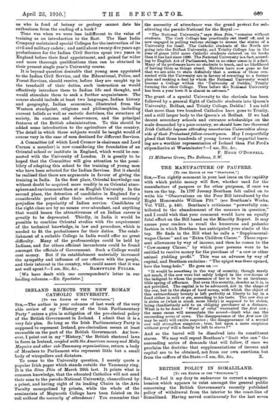THE MANUFACTURE OF PAUPERS.
[To THE EDITOR OF TUX " SPECTATOR."]
Sin,—You rightly comment in your last issue on the rapidity with which public money will flow, whether used for the manufacture of paupers or for other purposes, if once we turn on the tap. In 1797 Jeremy Bentham felt called on to write his " Observations on the Poor Bill introduced by the Right Honourable William Pitt" (see Bentham's Works, Vol. VIII., p. 440). Bentham's critioisms "powerfully con- tributed to the abandonment of the measure in question," and I could wish that your comment would have an equally fatal effect on the Bill based on the Minority Report. It may amuse your readers to recall the humorous and pedantic fashion in which Bentham has anticipated your simile of the tap. He finds in the Bill what he calls a " Supplemental- wages Clause" and an "Extra Children Clause." These repre- sent allowances by way of income, and then he comes to the " Cow-money Clause," by which poor persons were to be entitled to receive money for the purchase of " a cow or other animal yielding profit." This was an advance by way of capital, and Bentham exclaims : " The spigot was there opened, here the bung-hole." He goes on :-
" It would be something in the way of security, though surely not much, if the cow were but safely lodged in the cow-house of the indigent to whom the possession of her is to be an inexhaus- tible spring of affluence. But even this security, slender as it is, is not provided. The capital is to be advanced, not in the shape of the cow, but in the shape of hard money, with which the object of this extraordinary bounty is left perfectly at liberty to lay in a fund either in milk or gin, according to his taste. The cow dies or is stolen or (what is much more likely) is supposed to be stolen. being clandestinely sold to an obliging purchaser at a distance. What is to be done ? Want of relief' warranted the first cow ; the same cause will necessitate the second—limit who can the succeeding series of cows. The disappearance of the first cow (it may be said) will excite suspicion ; the disappearance of a second cow will strengthen suspicion ; true, but upon a mere suspicion without proof will a family be left to starve ?"
And so the barrel will be dissolved into its constituent staves. We may well repeat Bentham's "limit who can" the succeeding series of demands that will follow, if once we proclaim the doctrine that supplementations of income and capital are to be obtained, not from our own exertions, but from the coffers of the State.—I am, Sir, &c., X.














































 Previous page
Previous page